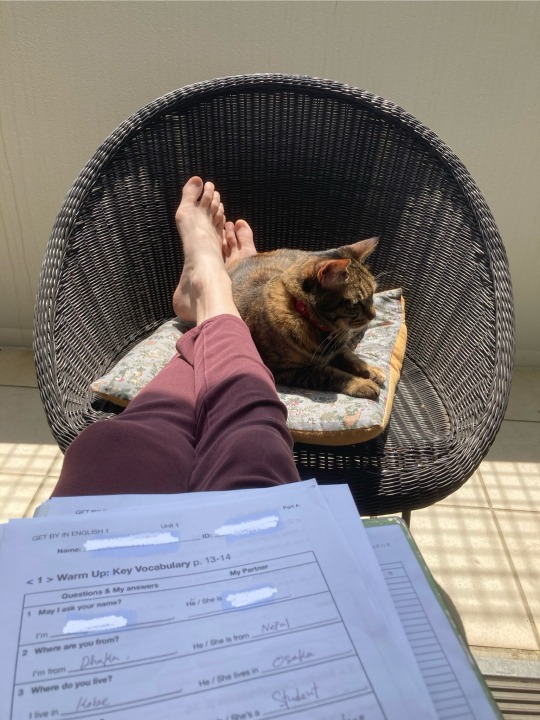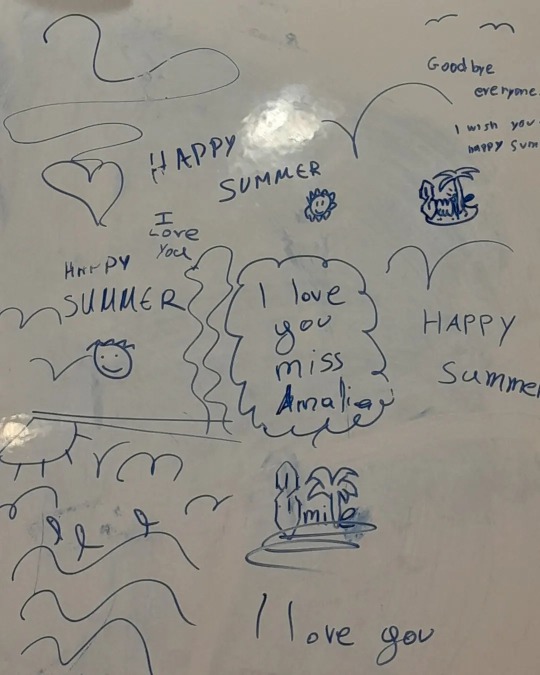#teaching English
Explore tagged Tumblr posts
Text
A fine teaching assistant

13 notes
·
View notes
Text

BUM RAP
Idiomatic Meaning: A false accusation or conviction; being blamed or punished unfairly for something one did not do.
Literal Meaning: “Rap” has many meanings and can be both a noun and a verb. In musical genres, it is similar to hip-hop, using rhythm and rhyme. A “bum” is old slang for what today might refer to someone who has no job, or money, or home. They can be disheveled and might have mental issues. If a bum also has a sense of rhythm and rhyme, it could be a bum rap.
Usage: Informal, spoken general American and English. The phrase implies a sense of injustice and undeserved negative consequences. Using the expression adds a strong emotional element, emphasizing the unfairness of the situation. You'll often hear it used when someone feels unjustly accused or when discussing cases of wrongful conviction.
Origin: Early 20th Century – The origin of this expression is somewhat debated, but the most likely explanation connects it to the slang term "bum" and the legal term "rap." "Bum"- In the late 19th and early 20th centuries, "bum" was a derogatory term for a vagrant, or a person considered worthless or lazy. This association suggests something negative and undesirable. "Rap"- In legal slang, "rap" has long referred to a criminal charge or accusation. Putting these together, "bum rap" likely emerged as a way to describe a bad or worthless accusation – one that is without merit and unfairly placed upon someone.
Why is this funny? In the photo, we see a disheveled, middle-aged man using a megaphone to address the passengers of a subway they are all riding. Basically, he is asking for money, but he does it in rhyme, much as a hip-hop or rap artist would use. Two passengers at the far end of the car recognize him as a former rap/hip-hop producer, once charged with plagiarism but not convicted and who now looks like a bum. He is a bum rapper who got a “bum rap!”
Sample sentence: The critics gave the play a “bum rap”, but I thought it was brilliant.
7 notes
·
View notes
Text
Poor students who freak out during their state exams. Not the first occasion when they a) cry b) have shaking hands c) have almost panic attacks. IMO, if there’s an ounce of knowledge in the head, you’ll pass the exam, so no need to worry, but, of course, no one can control the feelings.
4 notes
·
View notes
Text
Me to my coworker, who was also asked to stay behind during the school evacuation drill:

#gaijin#gaijin life#inaka#inaka life#ex pat#japan#japan life#jet program#english teaching#teaching english
2 notes
·
View notes
Text

being an english teacher can be really fun at times
#absolutely losing my shit at the smiley face in the end#just#:)#textpost#text post#media#eslclasses#eslteacher#esl#teaching english#teaching english as a second language#english teacher#homework#english homework#assignment#funny#vinposting
6 notes
·
View notes
Text
Here are some things that I’ve learned while teaching:
1. Background matters. Not because it’s not possible to learn for some people. I actually believe the opposite, that everyone can learn. But some people start their learning journey believing what the world has told them, that it’s impossible for them, and that is a huge obstacle, it’s important to bring that barrier down to help them open up and let the learning process begin.
2. Poor Vocabulary is the Great Wall! If you don’t enrich your vocabulary by reading, watching movies or series or paying attention to music lyrics, you just won’t be able to communicate things that matter; you’ll get stuck with the script you learned from your teacher but won’t be able to go further, and probably would not be able to understand a native speaker either, because colloquial speech is not how you learn it on any book.
3. Use of Native Language. It’s important to learn phrases and the different uses and meaning of the words, so learning about the culture and the dialect of the place you’re dreaming to visit or to move to is a must! Like I said before, perfect grammar is not the whole language.
4. Outdated Core Curriculum is a No! I think as teachers is important to have a list of topics that the students most learn, but we need to get creative on how we teach it, and be flexible with our ways, not every group will respond the same way to the material and not every person has the same learning style, so we have to observe how they respond to it and try to improve our plan in ways we know will work for them.
5. Lack of Speaking Skills is the pebble in the shoe. One dear teacher of mine used to say that being able to put something into words was what could materialize things, or even change our reality. And I think it has some true to it. If we can put it into words, then we are putting it into our minds, we start making it our own, and that’s how you learn. So I always try to make my students speak: to me, to their peers, to them selves, to their microwave if necessary! But it’s so very important for them to talk!
6. Lack of Confidence can be your worst enemy. So it’s important for us to celebrate even the smallest of things! Every step is a challenge that’s been conquered! So if you were able to read until this point 🔵 congratulations 👏🏻
9 notes
·
View notes
Text

Our job as EDUCATORS is not limited to the teaching of a language. Our first duty is to place a tiny portion of influence on how they view the world as they develop their own personality. To become confident, to stand up for what they believe, to respond to bullies, to resist when others try to intimidate them, to broaden their horizons through books. To BE THERE for them.
And guys, we just HAVE TO learn those participles, okay?
#personal#teachers#education#teacher things#teachers know#teacherblr#english teacher#teaching english#teaching
12 notes
·
View notes
Text

"Teacher why are you disassociating?"
2 notes
·
View notes
Text
How much should I charge for teaching English to my pig farm coworkers?
And what other tips and advice might you guys have for a new ESL teacher
The (possibly) helpful details.
I taught English classes at my workplace. My students are coworkers and mostly collage graduates from Central America usually from Mexico. This past fall I had about 10-17 people show up. About half of the students are just beginning in English and the others are more or less at a conversational level. When I start teaching again I plan to meet once a week for so many weeks and then take couple of weeks break and repeat. When I started last it was a trial run for me and the students and the company. The classes are free for the students and I was paid my salary for an hour of my time. But now that I passed the trial run I am submitting an invoice like a independent contractor and would like to change for my prep time. Most information I see online is for people working in institutions which doesn't seem helpful to me.
Any help will be appreciated thanks in advance future friends and strangers
#please help#how do I figure out what to charge?#esl#tesol#teaching english#teaching#english#freelance
3 notes
·
View notes
Text
Teaching English Abroad
So, I have been meaning to post this for some time. I guess hence the reason why I have created this account. Now, just to put this out there, this is my OWN personal intake on my experience living and teaching abroad. This is for those who do have an inkling to teach abroad, or want to gain some information on what it is like teaching abroad. Take this as you will, but I am laying out what I have been through teaching in a different country. This post will be put into two sections. This will be my first post. The second will be posted in a later post.
I first moved to Korea to teach English in February of 2023. Now, I always wanted to come to this country since my high school days. Yes, I am one of those who started off listening to K-Pop. I have lived in Korea for almost two years now, and I will move back to the States sometime in the early weeks of March. Shocking? Maybe to some, but not to others.
Now people will ask, why the sudden change of heart? Well, lets go back in February 2023. I moved to Korea for the first time, not knowing what to fully expect. Keep in mind, NEVER EVER have any high expectations on your English teaching job or the country itself. Witnessed a friend who had that type of mindset, and she did a midnight run back to the States in the middle of her contract. I did an interview with EPIK, and was able pass that. Paper works, visa, background check, all of that took soo much time. Also took majority of my paycheck. Anyways, you can choose where you want to be placed in Korea; but, it is their decision on where they will place you. *Keep in mind, you would need a TEFL certificate to send as well.*
I was placed in Busan, at least the 2nd biggest city in South Korea. Loved every minute of it. Met wonderful friends who I was able to get connected to, and gained wonderful co-teachers who have taught me so much on how to be a teacher. Now, I was lucky enough to be placed in a school with teachers who were so welcoming and helpful. That however, was just my first year here.
I have read and heard many stories of co-teachers who are just crazy to work with, and their dynamic relationship of co-teaching with them just did not work out. The following year, 2024, I decided to renew my contract and thinking it will be a good year; new co-teachers, since three of my old co-teachers left, kids moving up grades, and just my work dynamic will be either similar or different (thinking as a GOOD different). Well, oh how wrong I was.
*Part 2 will be put up*
2 notes
·
View notes
Text
It has come to my attention that many people do not know about the Superman Rule in English and I need to rectify that.
When using pronouns in sentences you sometimes add an s to the verb and you sometimes don't. That s is Superman and the reasoning is fairly simple.
She/He/It are too scared to do anything alone. They need Superman to help them out. She eats food with Superman. He goes running with Superman. It exists only when Superman is around.
We/They are always doing things in groups and don't need Superman to protect us/them.
I am not scared of anything, and You are strong enough to protect yourself, so neither of us need Superman.
There you go. Now you know the Superman rule. Share it with the world.
9 notes
·
View notes
Text

Here is this week's #photo #idiom. Can you guess the expression?
5 notes
·
View notes
Text
Funny mistakes:
Starry = stare.
Bear = beer (Teddy beer).
Interesting = interested and vice versa (I’m interesting.)
Factory = fabric / ‘fabrika’ in Russian (Charlie and the Chocolate Fabric).
1905 = 9005 (nineteen-oh-five and ninety-oh-five).
2 notes
·
View notes
Text
So I’m going to my JHS’s 送別会 (soubetsukai aka farewell party).
It’s being held after I finish up my last day there so I was going over some stuff with my colleagues.
Cuz it’s an overnight one at onsen resort and I have never stayed overnight for one before. All the ones I went to were just dinners.
Me: Hey so what is the dress code? Wanted to check cuz I messed up one year.
VP: It’s an onsen resort, yukatas of course!
(It was a joke, dress code is always suits. Would have been nice tho lol)

#gaijin#gaijin life#inaka#inaka life#ex pat#jet program#japan#japan life#english teaching#teaching english
4 notes
·
View notes
Text

Dragon Stew Teaching
When I was younger I really thought the story of Dragon Stew was quite clever, and the solution to the problem was so simple that it was genius!
If you don't know the story (and I may get a fact or two wrong as it has been years), the basic idea is that a King declared that he wanted to eat Dragon Stew and he tasked his people with catching a dragon. The dragon was caught and was getting prepped to be cooked in the stew. When it came down to the crucial moment, the dragon was desperate for his life and he talked the king into allowing him to cook a meal for him. He asked the king what he liked and he listened carefully and he used the information he had learned to make an absolutely delicious meal. The dragon managed to secure the job as the king's personal chef and he did so by listening every day and making exactly what the king wanted. Win/win. The dragon lived and the king got his 'dragon stew', though in the end that meant it was a stew made by a dragon. Apologies if I have mixed up some details of the story (let me know in the comments!).
Subconsciously, this has bled through into my philosophy as a teacher. There are, of course, non-negotiable staples that need to be in the classes I teach but beyond that, we need to know how we are going to please our students. How are we going to make our lesson time productive and useful for them? The answer is in their words, in their mannerisms in their consistent mistakes. Pay attention, take note and adapt your curriculum to those needs. Put aside your ego or the sense of entitlement your years of teaching affords you. We should always be developing and growing as teachers, this is how we keep our job and our lessons fresh.
On top of that, you can avoid being eaten. :-)
2 notes
·
View notes